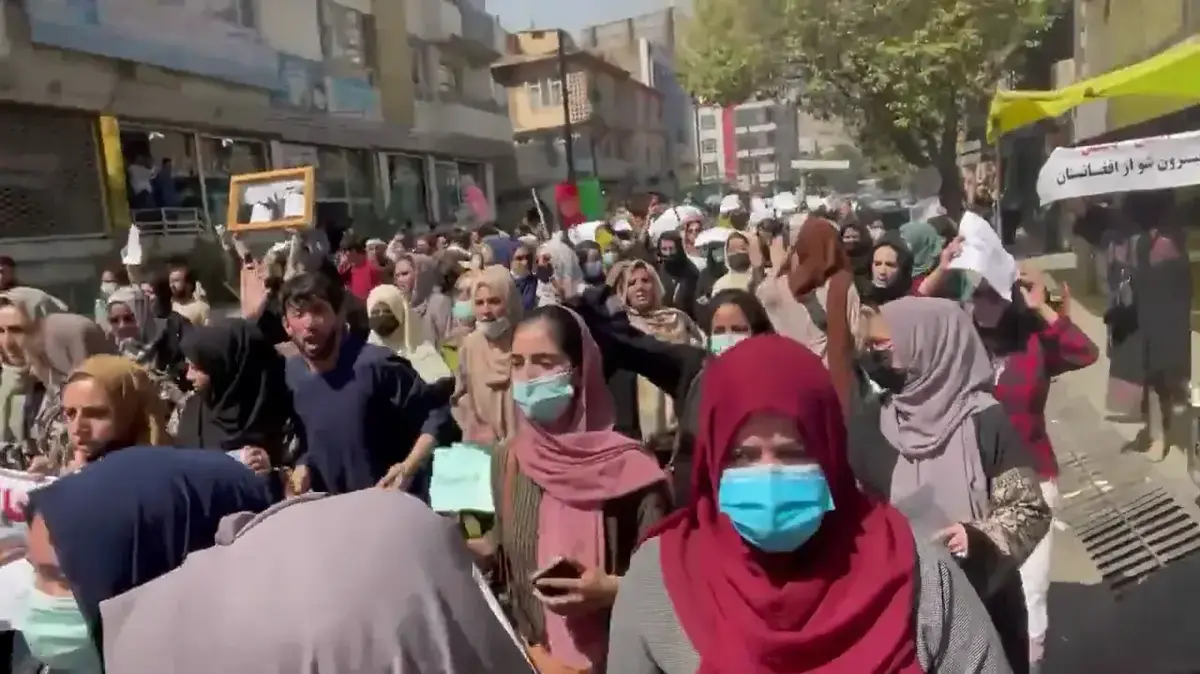A year of Taliban rule in Afghanistan: growing poverty, denial of rights and instability
About 25 million Afghans currently live in poverty - more than 50% of the total population, and there does not seem to be an immediate solution to the rise in prices, the rise in unemployment and hunger, which is expected to worsen with the coming of winter.
"We are all on the road to darkness and a terrible fate. People have no future"
Reuters
08/15/2022
Monday, August 15, 2022, 12:16 Updated: 12:55
Share on Facebook
Share on WhatsApp
Share on Twitter
Share by email
Share in general
Comments
Comments
On video: Women's demonstration in Afghanistan to mark the anniversary of the Taliban takeover (documentation on social networks)
Today (Monday), the Taliban marks one year of its rule, after the withdrawal of the United States from Afghanistan last year.
However, there are no celebrations for the occasion due to the fact that the Afghan people struggle daily with increasing poverty, drought, malnutrition and fading hope among women for a central role in the country's future.
A few people fired jubilant shots into the air on the occasion of the date in the capital Kabul, but most of the city's 4.5 million residents did not show much joy in light of the fact that a year ago the Taliban entered the city and took it over.
Although the country is safer now than it was when the radical Islamist movement fought against the foreign forces led by the United States and its allies in Afghanistan, this relative security does not hide the extent of the challenge that the Taliban faces in trying to place the country on a path of economic growth and stability.
The economic situation deteriorated further when foreign governments decided not to recognize the Taliban as a ruler, which isolated Afghanistan and exacerbated the economic crisis.
Aid funds on which the country relies heavily have been cut amid demands from the international community that the Taliban respect the rights of Afghans, especially girls and women in the labor and education sectors, whose rights have been denied.
About 25 million Afghans currently live in poverty - more than 50% of the total population.
According to the UN, about 900,000 jobs will be lost this year due to the economic crisis.
The Taliban demands that the foreign exchange reserves held by the central bank outside the country totaling $9 billion be returned to the country, but talks with the United States are complicated, also due to the American demand that the leader of the Taliban, who is under sanctions, step down from his position as vice chairman of the central bank.
The Taliban refuses the demands claiming that it respects all the rights of Afghans within their interpretation of Sharia.
Therefore, until there is a significant change in the positions of one of the parties, there does not seem to be an immediate solution to the rise in prices, the rise in unemployment and hunger, which is expected to worsen with the coming of winter.
"We are all on the road to darkness and a terrible fate," said Amana Arzu, a doctor in Razani district in the country's southeast.
"People have no future, especially women."
Lack of opportunities
Fatima, who lives in the Hart province of western Afghanistan, said that while she felt an improvement in security last year, girls' schools were closed and there was a lack of opportunities on the job market for women.
She asked that her full name not be revealed out of fear for her safety.
Jawud, from Helmand province in the south, has witnessed fierce fighting in the past, but now said security has improved dramatically since the Taliban returned to power after 20 years.
But he also noted rising inflation.
More in Walla!
Empathize with the women, rebels in the Taliban: Broadcasters in Afghanistan wear face masks on TV
To the full article
In video: Demonstration of women and children against the violation of women's rights under the Taliban regime (Photo: Reuters) In video: The Taliban spokesman clarifies that not recognizing their government will have consequences (Photo: Reuters)
The last time the Taliban ruled Afghanistan in the late 1990s, women could not work, girls could not go to school and Sharia law was brutally enforced, including public executions.
Civil society and independent media have shrunk and many have left the country.
According to the UN, the Taliban continues to limit dissent by arresting journalists, activists and demonstrators. However, a Taliban spokesman denied the reports and said that arbitrary arrests are now prohibited.
The government is now still considered a transitional or de facto government. The incumbent ministers whose decisions can be canceled by the instruction of the spiritual leader of the Taliban, based in the southern city of Kandahar.
According to experts, it is not clear how the legal and moral code of the Sharia will be interpreted and applied in reality. "The biggest problem is that there is no unity in the law," said Zalmai Nishta, an Afghan constitutional expert who previously served as an adviser to the government "Now the law is subject to the mistakes of the leader of the Taliban in Kandahar, and the mistakes of those who lead in his name... that's the problem."
news
world news
the Middle East
Tags
Taliban
Afghanistan

